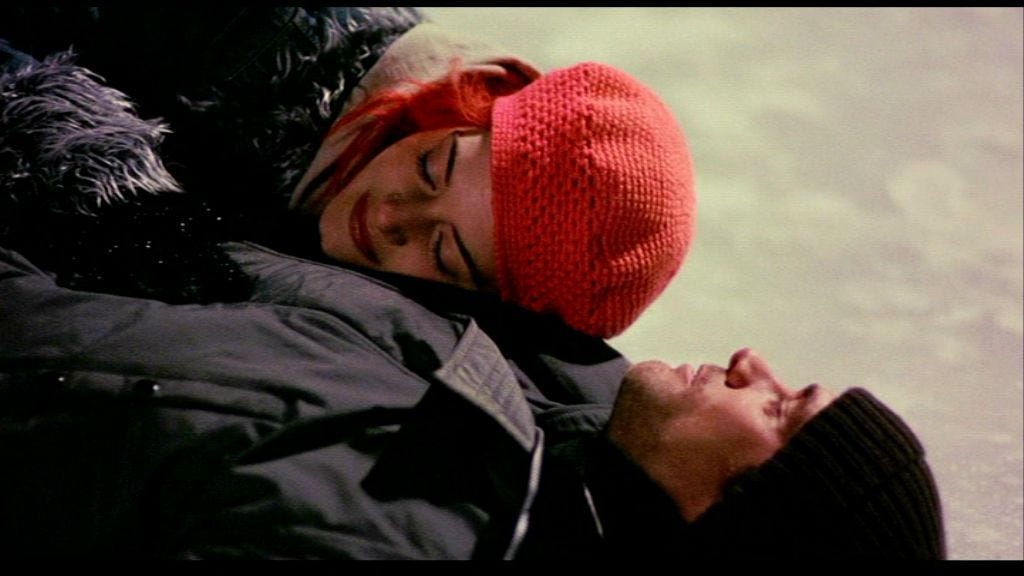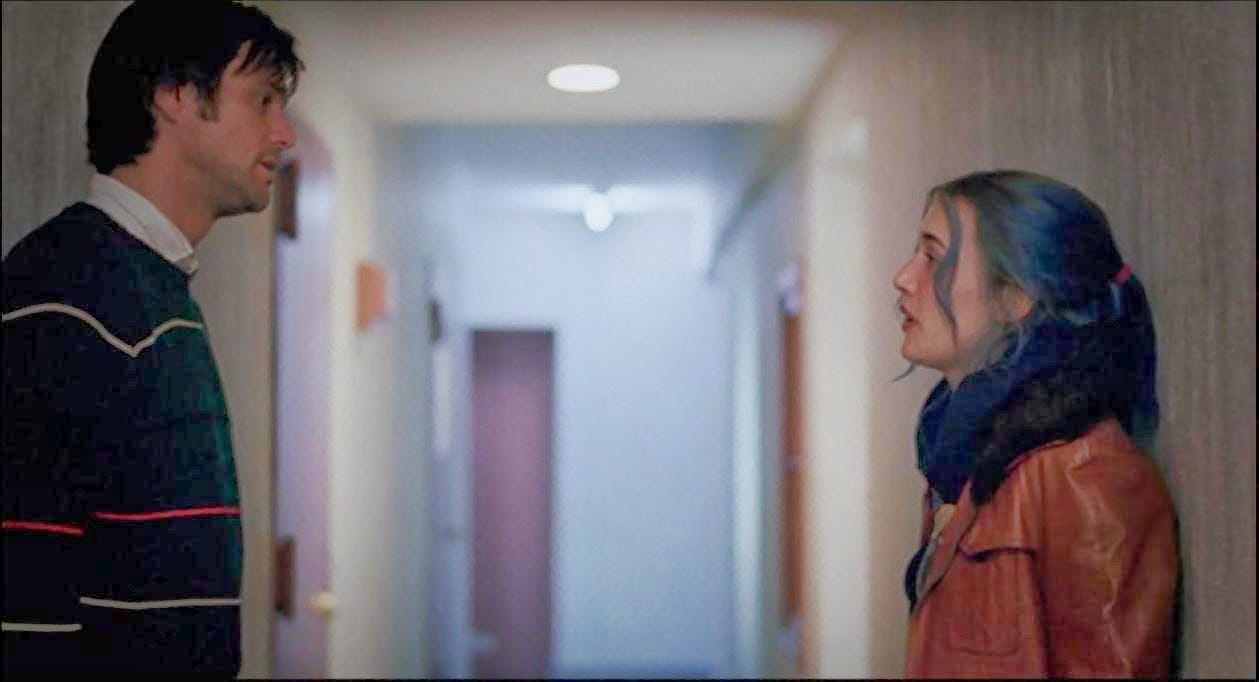The Favourites
Eternal Sunshine of the Spotless Mind
Eternal Sunshine of the Spotless Mind may be one of the most difficult films to discuss in terms of raw emotion. The film is completely and unabashedly loving and dreadful in the same breath as we travel through the mind of Joel (Jim Carrey) as he erases the memories of Clementine (Kate Winslet), after the end of their long-term relationship. The film begins at the end of their relationships when wounds have festered and words do more damage than good. As the soft science fiction machine of the film erases these memories, we trace the relationship in reverse, and we see the love these characters are capable of holding for each other. As these memories likewise get erased, the film becomes a thriller, a race against the clock, as Joel desperately tries to hold onto a single moment of the love he so desperately adored.
The combination of director Michel Gondry and screenwriter Charlie Kaufman is one of the most fruitful pairings of the 21st century. Both are acerbic in their tastes, with an innate ability to conceptualize stories in layered, philosophical ways. Kaufman’s other stellar work from around the same time as Eternal Sunshine includes the endlessly original Being John Malkovich and the ultimate exploration of the meta-narrative adaptation. Gondry’s work from this time includes the criminally underseen The Science of Sleep and the light and imaginative Be Kind Rewind. By combining the cerebral and haughty ideas of Kaufman and the daring visual storytelling of Gondry, Eternal Sunshine creates a unique experience that is visceral in both the emotions and the images. The canvas in which they paint is all the richer because these two artists worked in tandem, their styles so in sync.
The film is sickly stylish, as we spend the majority of the film in the slowly disappearing mind of Joel. Walls disappear, faces melt away, time ceases to exist as we (and Joel) simply appear from one moment to another. Memories are never linear plains but a jumbled mess of touch and smell, grace and disgrace, all of our moments of shame and excellence blended into a semblance of us. As Joel realizes his mistake, as he sees the beauty that existed in moments of blossoming love, he races against his own mind to save his own mind, a Mobius strip, a dog chasing his own tail, destined to lose it all, no matter how deep into his own memories he attempts to hide Clementine. It took losing her to realize what he had.
We can not forget the pain that Joel and Clementine caused each other. While the legacy of this film may be about the initial greatness of love, the falling out of this love is as real as its blossoming. When we meet Joel he is in hideous pain. He has no comfort, almost dismisses any comfort initially given to him, dwelling on this pain. His friends want him to move on, to not let this break-up define his life, but when they can’t convince him they provide him with what could be seen as an immediate relief - the memory-erasing service. They, much like Clementine and Joel, are looking for an easy way to comfort. But it’s this unwillingness to go through pain that damages everyone in the film.
Clem: I wish you had stayed.
Joel: I wish I had stayed too. NOW I wish I had stayed. I wish I had done a lot of things. I wish I had…I wish I had stayed. I do.
We are constantly being shown people taking shortcuts in the film. The memory erasing service is a way to erase grief by erasing the joys that are now missing. Patrick (Elijah Wood) sees an easy way to enter into a relationship by stealing the lived memories of Joel and Clem. Dr. Mierzwiak uses his procedure as an easy way to cheat on his wife and manipulate Mary. Throughout Joel’s memory erasure, Stan is shown slacking off, not taking the procedure seriously until it has fallen out of his control. Each of these “shortcuts” only proves to cause more pain and problems than the initial emotional release would have caused. By running away from difficulties we are cursing ourselves with hurt. Only through the pain of existence can we truly set ourselves free.
Not only does taking the easy emotional path rob us (and the characters) of truth and growth, but it also tinges our memories and moments with pain. Had Joel allowed for the pain of the breakup to run its course, he would continue holding the pain of the end of the relationship, but he’d also hold the joys of the blooming. While the love he and Clem had eventually curdled, it did exist, and if given time Joel would have been able to hold those memories dearly. By removing this growth as an option, Joel stunts himself and reverts back to the man he was before the relationship. Pain allows us to change as much as love does, and without either, we are doomed to repeat ourselves as Joel and Clem restart their romance at the end of the film. While their repetition is hopeful in the end, it is only hopeful as they hold the knowledge that things may not work.
The end of the film allows Joel and Clem to forgive each other and themselves for things they don’t even remember doing. With the knowledge that they have tried love before and it failed, they once again enter the fold, unafraid of the pain that could await them. The revelation of the memory erasure allows them the briefest glimpse of the transformative pain they would have gone through. While this does not provide them with the full closure they would have otherwise achieved, their willingness for failure (without retreat) is a strength they previously hadn’t held. We see with the relationship of Dr. Meirzwiak and Mary the opposite of this, the inability to accept failure, the denial of closure.
The doctor has erased Mary’s memories of their affair but not his own. This allows him to repeat the relationship over and over, without Mary’s knowledge, and without him growing and accepting the hurt of his actions. Only when Mary finds out of his deceit is he forced to live with that hurt, and it destroys his entire life. His business falls apart, his wife leaves him, and Mary will never speak to him again. With Joel and Clem, the mutual agreeance of an unknown future is what makes their ending hopeful. Meirzwiak was not looking for an end to the relationship, but a beginning without the troubles that rock any initial relationship. He wanted a shortcut to lust, and as we’ve seen there can be no shortcuts in emotions.
This mirrors the failed forced romance of Patrick and Clem. Patrick falls for Clem in the short amount of time he meets her during her memory erasure. Unwilling to risk rejection, Patrick steals the events from Clem and Joel’s relationship that she no longer remembers. He takes the nicknames Joel gave her, the places they went together, and attempts to insert himself into these moments. Patrick fails to understand that a relationship is not just the major events that we will remember forever but the little moments of grace in the every day. When you catch your loves scent linger in a room, when you sit in the same room in a comforting silence, when your breathing falls together. Without the connective tissue of these moments, love is not able to grow, and in only having the major moments that will stay forever Clem is confused and distressed. Love can not be sustained on such fragile moments of intimacy.
It’s these little moments, the forgotten threads from one memory to another, that Joel reexperiences throughout the film, and that we see when Clem and Joel, newly unfamiliar with each other, begin to rebuild. These are the important moments the film wishes to remind us of. While we do all have the grand moments of romance and devastation, these are culminations of love, not the acts of love themselves. By re-experiencing what it’s like to spend time with Clem without the burden of ever having hurt each other yet, Joel and Clem are able to love all over again. The film wants us to live in the moment, for that’s the only thing that matters. You can’t change the past, and if you could you would cease to be the person you are now.
Joel states that by the end of the relationship, he felt Clemintine was basically a stranger. But when they met she was even more of a stranger, and love came easily for both of them. It is only through living in the past, letting little errors and hurts gather collectively, and ignoring the beauty of what they have now, that Joel and Clem fall apart. The final scene, the acceptance of their collective past and the disregarding of that past is them truly deciding to live for each other at the moment. We can not live in our memories, and Joel and Clementine chose never to again.
Joel: I can’t see anything I don’t like about you.
Clem: But you will! But you will. You know, you will think of things. And I’ll get bored with you and feel trapped because that’s what happens with me.
Joel: Okay.
Clem: Okay.







Terrific distillation. It's like sitting down with a nice glass of whiskey, feet up by the fire to read your movie commentary. You deserve the best place by the fire, good sir!